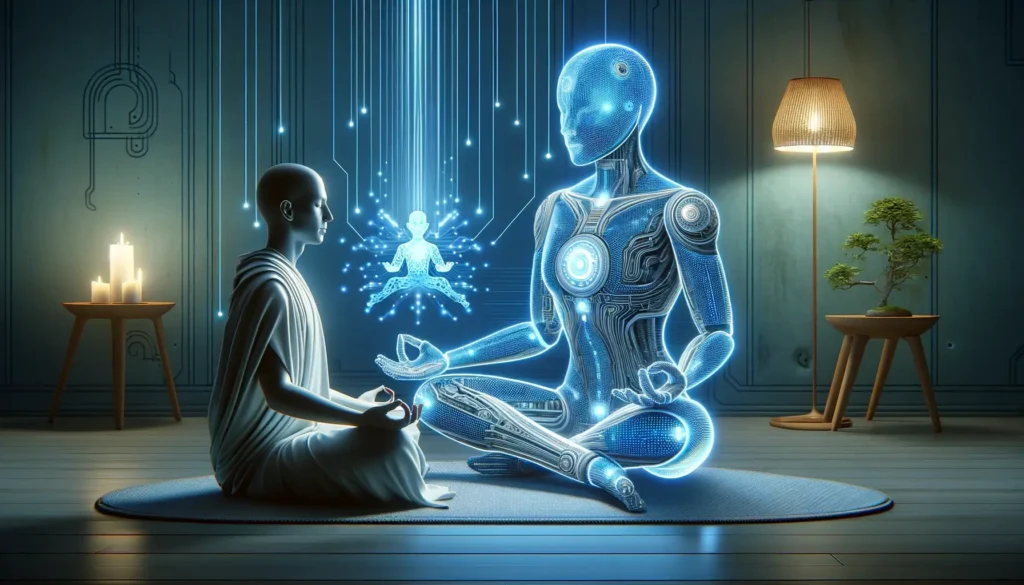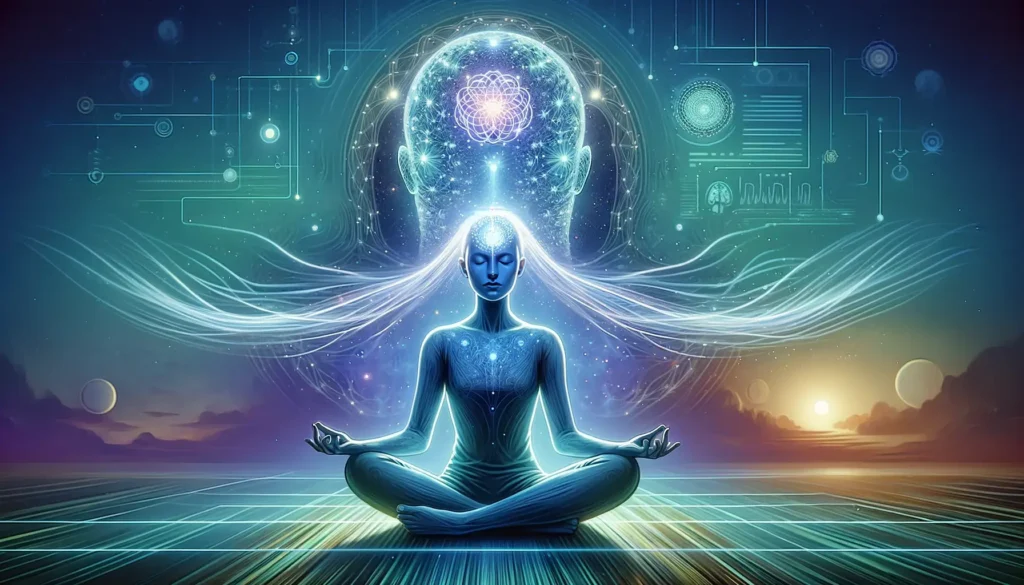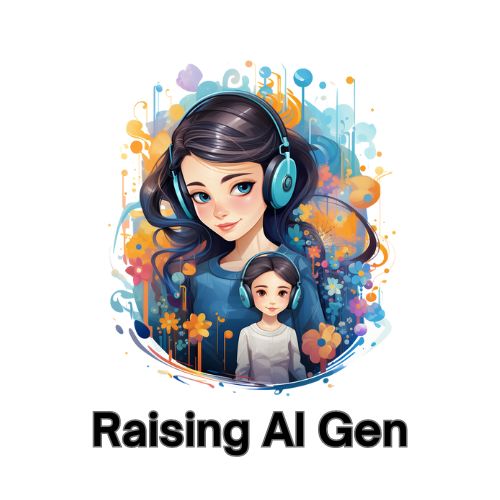In an age where the pursuit of mental wellness is more pressing than ever, advancements in technology open up a captivating world of potential for personal growth and inner peace. The integration of biofeedback and AI meditation companions marks a revolutionary chapter in the narrative of mindfulness training. These sophisticated tools work in concert to create a tailored meditation experience, leading users through a melodious journey of relaxation techniques that resonate with the ebb and flow of their unique psychological makeup.
As we explore the mesmerizing interplay between technology and the human psyche, we recognize that the key to amplified mental wellness lies within the mind-body connection, now enhanced by biofeedback’s data-driven insights. This symphony of the self is orchestrated by AI, striking a chord with each individual’s physiology and emotional landscape, and choreographing an experience that is as unique as the user themselves.
Key Takeaways
- The blending of biofeedback and AI provides a personalized meditation experience tuned to individual needs.
- Biofeedback techniques enable a deeper understanding of the mind-body connection, enhancing self-awareness.
- AI meditation companions employ real-time data to individualize relaxation techniques for optimal mental wellness.
- The application of these technologies represents a new frontier in mindfulness training, evolving beyond traditional practices.
- Through the innovative use of biofeedback and AI, meditators can achieve a finely balanced state of tranquility and emotional harmony.
Understanding Biofeedback and Its Role in Modern Meditation Practices
In the quest for mental wellness and effective stress management, modern meditation practices have embraced the integration of biofeedback to enhance traditional techniques. Through the application of biofeedback devices, individuals tap into a deeper awareness of their physiological state, discovering the intrinsic link between their physical and mental being.

The synergy of biofeedback with mindfulness training allows for a responsive and data-informed approach to relaxation, evolving the practice from a static routine to a dynamic self-care intervention.
What is Biofeedback and How Does it Enhance Meditation?
Biofeedback is the key to unlocking self-regulation and control over one’s physical responses to stress. By providing real-time feedback on bodily functions such as heart rate and muscle tension, biofeedback equips individuals with the knowledge required to consciously influence their state of relaxation. During mindfulness training, this real-time data acts as a guide to deepening meditation, enabling practitioners to actively modulate their stress levels for a more profound state of calmness.
Neurofeedback: A Subset of Biofeedback for Better Mental Wellness
As a specialized form of biofeedback, neurofeedback zeroes in on the brain’s activity, harnessing the power of electroencephalography (EEG) to map out the pathways of mental health. With neurofeedback, individuals learn to fine-tune their brainwave patterns, aiming for an optimal state conducive to mental wellness and cognitive performance. The ability to adjust one’s brain activity can help alleviate symptoms associated with anxiety, depression, and other forms of mental distress, thus serving as a cornerstone for ongoing self-care routines.
Integrating Biofeedback with Mindfulness Training for Greater Self-Awareness
Combining biofeedback with mindfulness training forges a partnership that heightens self-awareness and enhances meditation outcomes. This alliance empowers individuals to engage deeply with the meditative process, attuning their practices to the intricacies of their personal physiology. By visualizing their immediate physiological data during meditation, users can tailor their approach to stress management, customizing techniques to promote a tranquil mindset and nurture overall well-being.
In essence, biofeedback lays the foundation for a meditation experience that is not only personalized but also profoundly rooted in the understanding of one’s own biological rhythms and mental processes. Through this technologically-assisted journey into self-care, modern meditation transcends its traditional boundaries, offering a unique path to serenity and equilibrium, reflective of our modern drive for knowledge and self-improvement.
The Emergence of Biofeedback and AI Meditation Companion
The digital age has birthed a transformative innovation in the realm of mental wellness: the AI meditation companion. This synergy between cutting-edge technology and age-old mindfulness training is redefining the way we manage stress and foster mental equilibrium. By integrating the precision of biofeedback with the intelligence of AI, individuals can access bespoke meditation experiences that resonate uniquely with their physiological and emotional state, opening doors to enhanced stress management strategies.
With this technological wave, an AI meditation companion acts as a personal guide, taking the reins of your relaxation journey to steer you away from the cliffs of anxiety and towards the serene shores of tranquility. The biofeedback mechanism is the compass on this voyage, providing real-time insights into your biological signals, from heart rate variability to galvanic skin response, and transforming them into a map for personal exploration and growth.
By accessing and interpreting the subtleties of our bio-responses, AI meditation companions can present us with a treasure trove of personalized techniques designed to fortify our fortresses of calm.
The table below illustrates the interplay of biofeedback data points and their corresponding responses through the guidance of an AI meditation companion:
| Biofeedback Signal | Physical Response | AI Meditation Companion Action |
|---|---|---|
| Heart Rate Variability (HRV) | Fluctuations in heart rate | Advises on breathing exercises to regulate HRV for calmness |
| Skin Conductance | Changes in sweat gland activity | Suggests mindfulness activities to lower arousal levels |
| Brainwave Patterns | Shifts in focus and relaxation states | Recommends music or soundscapes to induce desired mental states |
| Muscle Tension | Tightness in specific muscle groups | Guides through progressive muscle relaxation techniques |
This data-driven approach ensures a more targeted and effective way to enhance your mental wellness. No longer will meditation be a one-size-fits-all solution; instead, it will be a finely tuned, personalized concerto composed of your body’s own signals, intelligently interpreted and conducted by AI.

Ultimately, the emergence of biofeedback and AI meditation companions is a promising horizon in the universe of self-care. It’s an advent that showcases how technology can join hands with human intent, fostering a landscape where each breath we take and each beat of our heart can guide us to a haven of peace and self-mastery through the art of mindfulness.
AI and Biofeedback: Tailoring Meditation to Your Psychological Profile
In the personalized landscape of mental wellness, the fusion of AI meditation companions with biofeedback represents a significant advancement in customizing meditation practices. Through a deep understanding of the mind-body connection, this integrated approach adapts and responds to the individual’s psychological profile, offering a dynamic and tailored meditation experience.
AI-Powered Insights: Fine-Tuning Meditation Based on Real-Time Data
Utilizing an AI meditation companion, one can experience the benefits of neurofeedback insights that are pivotal in personalizing meditation sessions. This real-time data, ranging from heart rate variability to electroencephalogram (EEG) readings, provides an accurate reflection of an individual’s immediate state, guiding them towards targeted relaxation techniques designed to optimize their emotional and physical well-being.
Customizing Stress Management Strategies with AI and Neurofeedback
The intricate collaboration of AI and neurofeedback channels the potential to revolutionize stress management strategies. By analyzing personal biometric data, AI tailors relaxation protocols to alleviate stress responses, enhancing the user’s resilience and fostering a deeper engagement with tailored meditation practices.
Embracing AI to Deepen the Mind-Body Connection in Meditation
Embracing the advancement of technology through an AI meditation companion does not mean departing from the essence of meditation. Instead, it’s a step further in fully understanding and harnessing the mind-body connection. By integrating neurofeedback seamlessly into the meditation process, users are afforded a profound depth of introspection and the empowerment to evolve their practice in sync with their physiological needs.

Applying Advanced Relaxation Techniques: From Mindfulness to Biofeedback Symphony
The landscape of personal meditation is undergoing a profound transformation, courtesy of advancements in technology. Gone are the days of one-size-fits-all relaxation techniques; we’re now entering an era where tools such as biofeedback devices and AI meditation companions are making waves in the realms of self-care and stress management. This integration of AI with mindfulness strategies heralds a new dawn for those endeavoring to achieve mental wellness through fine-tuned relaxation methodologies.
The Role of Technology in Evolving Relaxation and Self-Care Rituals
Technology has become a formidable ally in our quest for tranquility and emotional balance, playing a pivotal role in the enrichment of relaxation and self-care rituals. As we increasingly turn to digital aids for support, the proliferation of biofeedback devices has made it simpler for individuals to monitor and adjust their physiological functions to combat stress. This transition from conventional relaxation techniques toward a tech-savvy, personalized approach underscores the profound impact technology has on our daily pursuit of serenity.
Creating a Personalized Soundscape: How AI Transforms Meditation Experience
Immerse yourself in the gentle cadence of a personalized soundscape, tailored by an AI meditation companion to reflect your innermost needs. It’s here that technology shines brightest, analyzing cues from biofeedback to envelop you in an auditory environment designed to soothe and rejuvenate. This is the future of meditation—a transformative journey crafted by AI, elevating the traditional mindfulness experience into a richly individual tapestry of sounds and silences that speak directly to your soul.
From Mindfulness Apps to AI Companions: The Future of Personal Meditation
As our journey with mindfulness evolves, so do the tools that accompany us. The leap from basic mindfulness apps to sophisticated AI meditation companions marks a significant step in the evolution of personal meditation. Taking strides beyond the realms of static audio tracks and generic guided sessions, AI companions tap into the power of machine learning to craft bespoke meditative experiences. They assess, learn, and evolve in harmony with your unique physiological rhythms and preferences, leading you down a path of deepened self-awareness and inner peace.
Frequently Asked Questions
| Question | Answer |
|---|---|
| What are the similarities between meditation and biofeedback? | Both meditation and biofeedback are techniques used to enhance mental wellness. They share a common goal of helping individuals achieve a state of relaxation and mindfulness. While meditation focuses on mental exercises and awareness, biofeedback uses technology to provide real-time feedback on physiological functions, aiding in self-regulation and relaxation. |
| What is our AI bot for mental wellness support called as? | Our AI bot for mental wellness support is named “MindfulAI,” designed to assist users in achieving better mental health through guided meditations, mindfulness exercises, and personalized wellness tips. |
| Is there such thing as an AI therapist? | Yes, AI therapists exist in the form of chatbots or virtual agents that use artificial intelligence to provide psychological support. They are programmed to recognize and respond to various mental health concerns, offering guidance and resources, but they do not replace professional human therapists. |
| Can AI be used for mental health? | Absolutely. AI can be used in various aspects of mental health care, including diagnosis, treatment recommendations, and providing support through chatbots or virtual therapists. AI’s ability to analyze data can help in understanding patterns in mental health and personalizing care for individuals. |
| How does biofeedback technology enhance meditation practices? | Biofeedback technology enhances meditation by providing tangible feedback on physiological responses, like heart rate or brainwaves, during meditation sessions. This allows users to understand their body’s reactions and adjust their meditation techniques for more effective relaxation and mindfulness. |
| What are the benefits of integrating AI into meditation apps? | Integrating AI into meditation apps offers personalized meditation experiences, adapting to individual’s preferences, meditation history, and specific wellness goals. AI can also track progress over time and suggest improvements, making meditation more effective and tailored to each user. |
| Can AI meditation apps help in managing stress and anxiety? | Yes, AI meditation apps are designed to help manage stress and anxiety by providing personalized meditation and mindfulness exercises. They adapt to the user’s specific needs and can offer targeted techniques to alleviate stress and improve mental well-being. |





